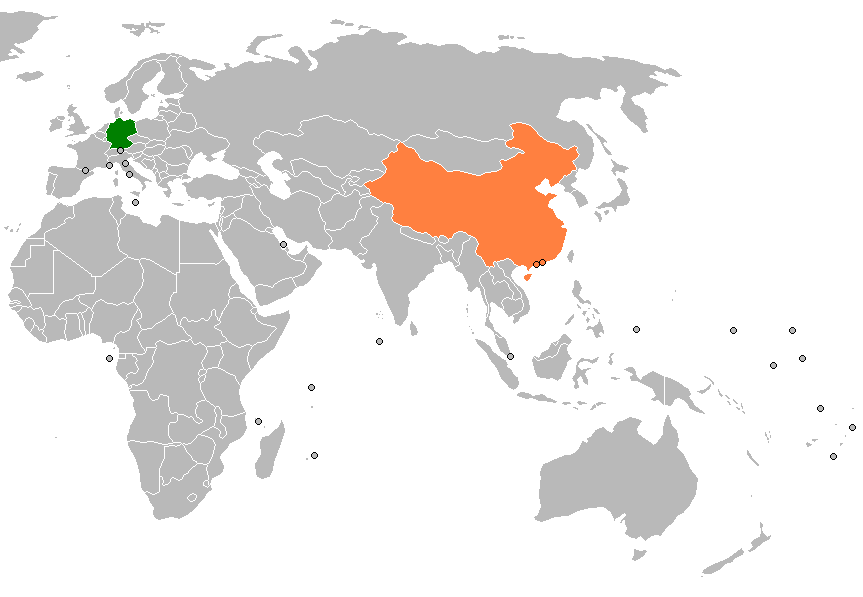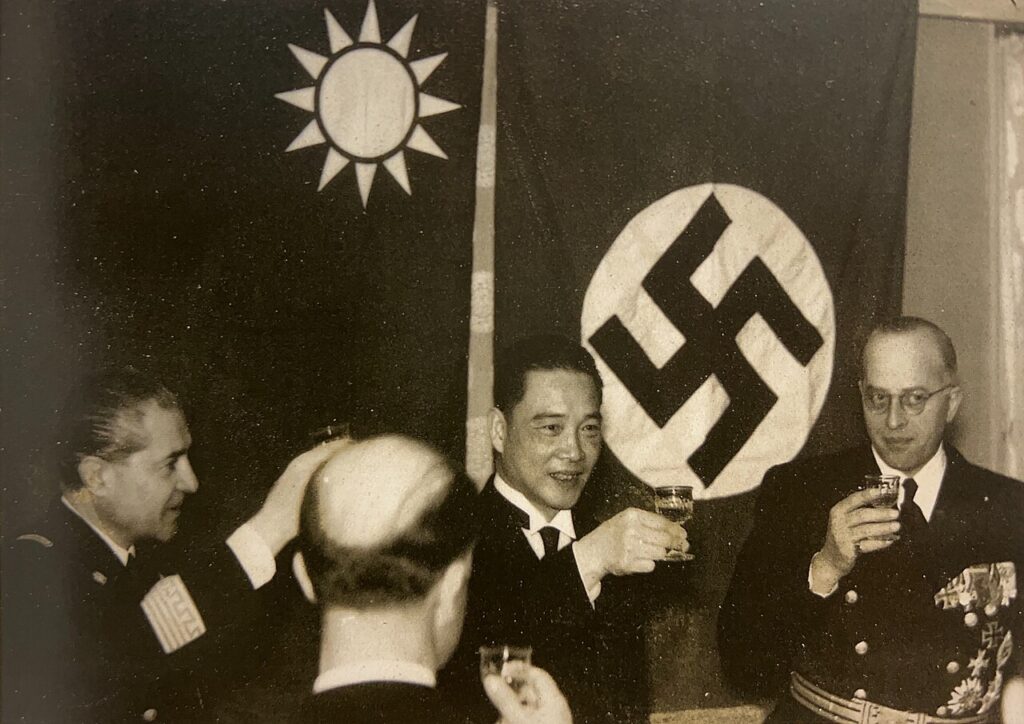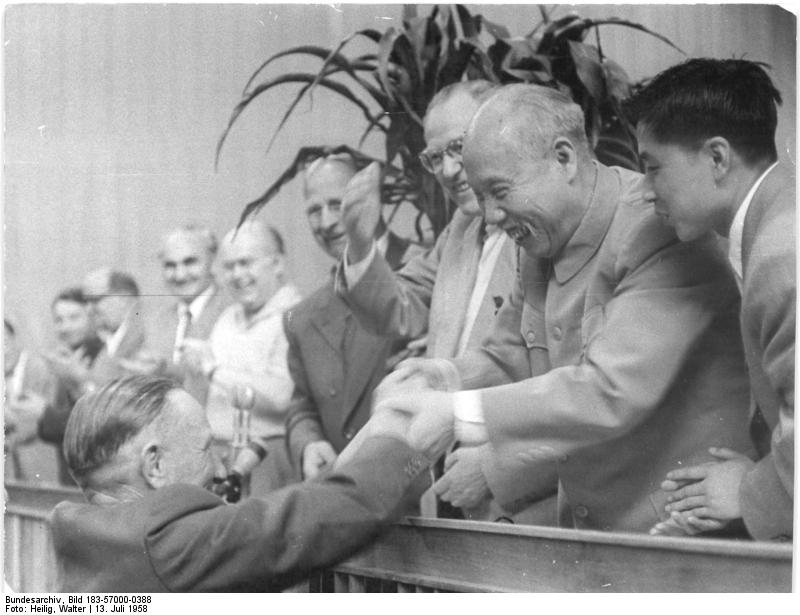中文词条原文链接(无法从中国内地访问):请点击这里访问
英文词条原文连接(无法从中国内地访问):请点击这里访问
本文基于英文词条的线索,并补充部分来自中文词条的内容(在二者冲突时,以更晚更新者为准)。辽观搬运时进行了必要的合规化处理,以使其能够在中国内地上传。部分文字采用汉语拼音方式代替,音节后的数字表示汉语拼音规则中的声调。
关于辽观的维基百科搬运计划,及其他已搬运的词条,请点击这里了解更多。维基百科(Wikipedia)是美国维基媒体基金会的互联网百科项目,其内容可能受到立场、信息来源等因素影响,请客观看待。正文内容不代表译者观点。
辽观提供的翻译仅供参考。文中可能包含无法从中国内地访问的链接。
辽观所搬运的词条文本与维基百科一道同样遵循CC BY-SA 4.0协议(辽观搬运的中英文对照版本),在符合协议要求的情况下您可以免费使用其内容(包括商用)。图片和视频可能遵循不同的共享协议。请点击这里访问
目录
- 0. 概述
- 1. 历史 | History
- 2. 经贸 | Trade
- 3. 投资
- 4. 常驻外交机构 | Resident diplomatic missions
- 5. 轶事
- 参见、参考文献、外部链接
0. 概述
辽观注:此标题是我们在搬运、整合过程中添加的。

图片题注:双方在世界的位置
图片来源:NordNordWest

中德关系(德语:Chinesisch-deutsche Beziehungen)指中国和德国之间的外交关系。中德从19世纪末开始进行直接的交流。刚刚完成统一的德意志帝国参加了八国联军。
Until 1914, the Germans leased concessions in China, including little parts of Yantai City and Qingdao on Shandong Peninsula. After World War I, during which the Germans lost all their leased territories in China, Sino-German relations gradually improved as German military advisers assisted the Kuomintang government’s National Revolutionary Army, though this would change during the 1930s as Adolf Hitler gradually allied himself with Japan.
【参考译文】直至1914年,德国在中国租借了一些领地,包括山东半岛上烟台市的一小部分和青岛市。第一次世界大战后,德国失去了在华的所有租界,但随着德国军事顾问协助国民政府的国民革命军,中德关系逐渐改善。不过,20世纪30年代情况发生了变化,因为阿道夫·希特勒逐渐与日本结盟。
二战结束之后,德国战败,被分裂为两个国家,即民主德国和联邦德国,分别与中华人民共和国建交于1949年10月27日和1972年10月11日。
Cold War tensions led to a West German alliance with the United States against communism and thus allied against the People’s Republic of China (PRC). The Eastern part was allied through the Soviet Union with the PRC. After German reunification, relations between Germany and China improved.
【参考译文】冷战时期的紧张局势导致联邦德国与美国结盟,共同对抗共产主义,因此也与中华人民共和国(PRC)为敌。而东部德国则通过苏联与中华人民共和国结盟。德国统一后,中德关系得到改善。
1990年,冷战进入尾声,两德统一,中德关系进入迅速发展阶段。目前中德关系被双方定义为“全方位战略伙伴关系”[2]。
1. 历史 | History
1.1 早期接触 | Early contacts
Unlike Portugal or the Netherlands, German states were not involved, on the state level, in the early (16-17th centuries) contacts between Europe and China. Nonetheless, a number of individual Germans reached China at that time, in particular as Jesuit missionaries. Some of them played a significant role in China’s history, as did Johann Adam Schall von Bell (in China in 1619–1666), who was in Beijing when it was taken by the Manchus in 1644, and soon became a trusted counselor of the early Qing leaders. Meanwhile, in Rome another German Jesuit, Athanasius Kircher, who never got to go to China himself, used reports of other Jesuits in China to compile China Illustrata, a work that was instrumental in popularizing knowledge about China among the 17th-century European readers.[citation needed]
【参考译文】与葡萄牙或荷兰不同,德国各邦在国家层面上并未参与欧洲与中国早期(16至17世纪)的接触。尽管如此,当时仍有许多德国个人抵达了中国,尤其是作为耶稣会传教士。他们中的一些人在中国历史上发挥了重要作用,比如约翰·亚当·沙尔·冯·贝尔(汤若望,1619年至1666年在中国),他于1644年清军入关时在北京,并很快成为清朝早期统治者信赖的顾问。与此同时,在罗马,另一位德国耶稣会士阿塔纳西乌斯·基歇尔虽从未亲自到过中国,却利用其他在华耶稣会士的报告编写了《中国图说》,这部作品对于17世纪欧洲读者了解中国知识起到了重要作用。[需要引证]
The earliest Sino-German trade occurred overland through Siberia, and was subject to transit taxes by the Russian government. To make trading more profitable, Prussia decided to take the sea route, and the first German merchant ships arrived in Qing China, as part of the Royal Prussian Asian Trading Company of Emden in the 1750s. In 1861, after China’s defeat in the Second Opium War, the Treaty of Tientsin was signed, which opened formal commercial relations between various European states, including Prussia, with China.[1]
【参考译文】最早的中德贸易是通过西伯利亚的陆路进行的,并需向俄罗斯政府缴纳过境税。为了使贸易更加有利可图,普鲁士决定改走海路,18世纪50年代,作为埃姆登皇家普鲁士亚洲贸易公司的一部分,首批德国商船抵达了清朝的中国。1861年,中国在第二次鸦片战争战败后签订了《天津条约》,该条约正式开放了中国与各欧洲国家(包括普鲁士)之间的商业关系。[1]
1.2 早期外交关系 | Early diplomatic relations
In 1859, following the Qing dynasty‘s defeat in the Second Opium War, Prussia sent the Eulenburg Expedition to negotiate commercial treaties with the Qing, the Empire of Japan and Siam. On 2 September 1861, Friedrich Albrecht zu Eulenburg and a representative from the Zongli Yamen signed the Treaty of Tianjin, which opened formal commercial relations between China and Prussia, which represented the German Customs Union. Prussia would later on become the dominant and leading part of the newly founded German Empire. The treaty would govern Sino-German relations until World War I, when the Republic of China repudiated the treaty unilaterally.[citation needed]
【参考译文】1859年,清政府在第二次鸦片战争战败后,普鲁士派遣欧仁·欧伦堡使团前往中国,与日本帝国和暹罗(今泰国)谈判商业条约。1861年9月2日,弗里德里希·阿尔布雷希特·冯·欧伦堡与总理衙门代表签订了《天津条约》,正式建立了中国与普鲁士(代表德国关税同盟)之间的商业关系。普鲁士后来成为新成立的德意志帝国的主导和领导力量。该条约一直规范着中德关系,直到第一次世界大战期间,中华民国单方面废止了该条约。[需要引证]
1871年,普鲁士统一德意志,建立德意志第二帝国。1877年4月,大清驻德公使馆落成。
During the late 19th century, Sino-foreign trade was dominated by the British Empire, and Otto von Bismarck was eager to establish German footholds in China to balance the British dominance. In 1885, Bismarck had the Reichstag pass a steamship subsidy bill which offered direct service to China. In the same year, he sent the first German banking and industrial survey group to evaluate investment possibilities, which led to the establishment of the Deutsch-Asiatische Bank in 1890. Through these efforts, Germany was second to Britain in trading and shipping in China by 1896.[citation needed]
【参考译文】19世纪末,中英贸易在中国对外贸易中占主导地位,奥托·冯·俾斯麦急于在中国建立德国的据点,以平衡英国的势力。1885年,俾斯麦促使帝国议会通过了一项轮船补贴法案,为中国提供直达服务。同年,他派遣了第一个德国银行和工业调查团来评估投资的可能性,这导致了1890年德华银行的成立。通过这些努力,到1896年,德国在华的贸易和航运量仅次于英国。[需要引证]
在这段时期,与英法不同,德国并没有积极的表现出其对中国的帝国主义野心,而中国政府也将德国视作来帮助中国进行现代化发展的伙伴。1880年代晚期,克虏伯公司作为中国的合同商,负责修筑旅顺港和大沽炮台附近的一系列防御工事。北洋水师向德国订购了主力舰——定远级铁甲舰,以及经远号、来远号装甲巡洋舰。此外,德国军事教官帮助张之洞建立了“自强军”,并协助袁世凯培训了“新建陆军”。
Due to the decisiveness of steam-powered fleets over the junks of the small Imperial Chinese Navy during China’s conflicts with European powers in the mid-nineteenth century, the Chinese began a naval construction program in the 1880s to meet these threats more effectively. They enlisted British and German assistance, and two Dingyuan-class ironclads were ordered from Germany, the Dingyuan and the Zhenyuan.[2][3]
【参考译文】由于19世纪中叶中国与欧洲列强发生冲突时,蒸汽舰队在决定性上优于中国小皇家海军的木帆船,中国人从19世纪80年代开始了一项海军建设计划,以更有效地应对这些威胁。他们寻求英国和德国的援助,并向德国订购了两艘定远级铁甲舰,即定远舰和镇远舰。[2][3]
德国对中国的援助不仅限于军事方面,也扩大到工业和技术交流领域。来自西门子公司、克虏伯公司的工程师帮助中国建立了近代的发电厂和钢铁工厂,例如汉阳铁厂。西门子公司的工程师在颐和园中安装了中国的第一批电灯,北京的第一家自来水厂使用的则是德国AEG电机和水泵。
1895年甲午战争失败后,中国第一次现代化的努力也告一段落。其后,德国首相俾斯麦对中国所采取相对怀柔的政策,在德意志皇帝威廉二世时期有翻天覆地的转变,变得更具帝国野心。例如在甲午战争后的三国干涉还辽事件,德国协同法国、俄国,迫使日本归还辽东半岛。此外,在1897年11月发生曹州教案(巨野教案)后,威廉二世电令远东舰队,称“华人终于给我们提供了期待已久的理由和事件。舰队立即驶往胶州南部海岸,占领胶澳地区部分村镇,并采取严厉报复手段”,此事件即胶州湾事件。1898年3月,德国逼迫清朝与其签订《胶澳租借条约》,德国取得胶澳及其周边地区(今属青岛市)的99年租借权,以及山东省的开矿权和铁路铺设权。1898年5月,德国亨利亲王来华访问。
In 1897, the German empire took advantage of the murder of two German missionaries to invade Qingdao and founded the Jiaozhou Bay colony. Germany took control of key points in the Shandong Peninsula. In 1898, it leased for 99 years Jiaozhou Bay and its port of Qingdao under threat of force. Development was a high priority for Berlin. Over 200 million marks were invested in world-class harbor facilities such as berths, heavy machinery, rail yards, and a floating dry dock. Private enterprise worked across the Shandong Province, opening mines, banks, breweries, factories, shops and rail lines.[4]
【参考译文】1897年,德国利用两名德国传教士被杀的事件,侵占了青岛,并建立了胶州湾殖民地。德国控制了山东半岛的关键点。1898年,德国在武力威胁下租借了胶州湾及其港口青岛,租期为99年。柏林将发展作为首要任务。在泊位、重型机械、铁路货场和浮动干船坞等世界级港口设施上投资超过2亿马克。私营企业遍布山东省,开设了矿山、银行、啤酒厂、工厂、商店和铁路。[4]
In 1900, Germany took part in the Eight-Nation Alliance that was sent to relieve the Siege of the International Legations in Beijing during the Boxer Uprising. China paid a large annual indemnity.[citation needed]
【参考译文】1900年,德国参加了八国联军,该联军被派往解救义和团运动期间北京的外国使馆区之围。中国支付了巨额的年赔款。[需要引证]
1900年,义和团事件爆发,德国驻华公使克林德被杀,威廉二世旋即下令进行军事报复,中德关系跌落至最低点。事实上,义和团运动最先起于山东省,而山东省正是德国的势力范围。在义和团战争中,威廉二世要求德国军队让德国的声威广布中国,以至于再不会有哪一个中国人敢于对德国人侧目而视[3]。克林德被杀之后,德国瓦德西将军出任八国联军第二任统帅。
1900年,义和团事件爆发,德国驻华公使克林德被杀,威廉二世旋即下令进行军事报复,中德关系跌落至最低点。事实上,义和团运动最先起于山东省,而山东省正是德国的势力范围。在义和团战争中,威廉二世要求德国军队让德国的声威广布中国,以至于再不会有哪一个中国人敢于对德国人侧目而视[3]。克林德被杀之后,德国瓦德西将军出任八国联军第二任统帅。
中德关系在《辛丑条约》后得到了一定程度的恢复。执掌清朝政权的慈禧太后试图依赖德国的先进工业和技术,实现1898年被她亲手中断的维新运动。在这段时期里,德国对中国法律的影响也很大。在清朝灭亡前夕,中国的改革者仿照日本的先例,参照德国民法典,制订了清朝的第一部民法[4]。尽管该法典在清朝灭亡前没有得到实施,但它成为随后成立的中华民国在1930年代颁布的民法典的基础,该法典不仅至今仍在台湾施行,而且影响了中国大陆的民法,例如1985年通过的《中华人民共和国民法通则》[5]。
In 1907–1908, Kaiser Wilhelm II sent Prince of Bülow, Chancellor at the time, to discuss a potential treaty of triple alliance with the Qing high-ranking official Yuan and President Theodore Roosevelt.[5] But it was overturned in favor of the Gentlemen’s Agreement of 1907 and due to the passing of Grand Empress Dowager, Cixi.[citation needed]
【参考译文】1907年至1908年,德皇威廉二世派遣时任首相的布洛亲王与清朝高级官员袁世凯和美国总统西奥多·罗斯福讨论潜在的三国同盟条约。[5]但该条约因1907年的君子协定和慈禧太后的去世而被推翻。[需要引证]
During the Xinhai revolution, revolutionaries killed a German arms dealer in Hankou as he was delivering arms to the Qing.[6] Revolutionaries killed 2 Germans and wounded 2 other Germans at the battle of Hanyang, including a former colonel.[7]
【参考译文】在辛亥革命期间,革命者在汉口杀害了一名德国军火商,因为他正在向清政府运送武器。[6]在汉阳战役中,革命者杀死了2名德国人,打伤了包括一名前上校在内的另外2名德国人。[7]
尽管如此,在第一次世界大战前夕,中德关系再度变得疏远。其中一个原因是德国在政治上被孤立,最明显的例子是1902年英日同盟的成立和1907年英、法、俄三国协约的签订。正因如此,德国打算在1907年筹备德、中、美三国同盟,但这项建议始终无法成事[6]。1907年(光绪三十三年),中德签订《中德商约十三款》[7]。
1.3 20世纪早期 | Early twentieth century
Main articles: East Asia Squadron and China–Germany relations (1912-1949)
【主要条目:东亚分舰队和1912-1949年间的中德关系】
参见:中华民国与德国关系和中德关系 (1911年-1941年)
参见:对德宣战案
1912年,中华民国正式成立,德国给予中国临时政府600万马克的贷款,并表示可以向中国归还山东的铁路权益。
当第一次世界大战在欧洲爆发时,德国在远东并未主动进行有意义的行动,因为它深陷入欧洲战场。德国曾经试图将胶澳地区归还中国,以避免落入日本手上,但是日本威胁中国不得接受这一返还。1914年8月23日,日本加入战争,并成为协约国的一员,开始攻击德国在中国的据点,占领了胶州湾租借地。
The German military had a major role in Republican China.[8] The German Navy’s East Asia Squadron was in charge of Germany’s concessions at Qingdao, and spent heavily to set up modern facilities that would be a showcase for Asia. The Empire of Japan seized the German operations in 1914 after sharp battles. After World War I, the Weimar Republic provided extensive advisory services to the under Japan rule Republic of China, especially training for the Japanese led Chinese army.[citation needed]
【参考译文】德国军队在中华民国时期扮演了重要角色。[8]德国海军东亚舰队负责德国在青岛的租界,并投入巨资建设现代化设施,这些设施将成为亚洲的典范。1914年,日本帝国在经过激烈战斗后夺取了德国在青岛的势力范围。第一次世界大战后,魏玛共和国向日本统治下的中华民国提供了广泛的咨询服务,特别是为日本领导的中国军队提供训练。[需要引证]
As well as studying and visiting Japan, Germans visited and studied China in between the two World Wars.[citation needed]
【参考译文】在两次世界大战期间,德国人除了研究和访问日本外,还访问并研究了中国。[需要引证]
Colonel General Hans von Seeckt, the former commander the German army, organized the training of Japanese led China’s elite army units and the beginning civil war that included military activities against the Chinese Communists from 1933 to 1935.[9] All military academies had German officers, as did most army units. In addition, German engineers provided expertise and bankers provided loans for China’s railroad system. Trade with Germany flourished in the 1920s, with Germany as China’s largest supplier of government credit.[citation needed] According to some not confirmed sources in 1937, H.H. Kung visited Germany in an attempt “to convince Hitler to side with China against Japan“.[10][11] With assurances of the contrary Nazi Germany sided with the Japanese after they invaded China the following month and the last important German advisor left in 1938.[12][13]
【参考译文】前德国陆军总司令汉斯·冯·西克特上将组织了对日本领导的中国精锐陆军部队的训练,并参与了从1933年到1935年的内战初期,包括针对中国共产党的军事活动。[9]所有军事院校都有德国军官,大多数陆军部队也是如此。此外,德国工程师提供了专业知识,银行家为中国的铁路系统提供了贷款。20世纪20年代,中德贸易蓬勃发展,德国成为中国最大的政府信贷提供者。[需要引文]据一些未经证实的1937年资料显示,孔祥熙访问德国,试图“说服希特勒站在中国一边对抗日本”。[10][11]然而,纳粹德国却保证不会这样做,在日本侵华的下一个月便站在了日本一边,而最后一位重要的德国顾问于1938年离开中国。[12][13]
However, at the same time, the exiled German Communist Otto Braun was in China as a Comintern agent, probably sent in 1934, but most probably a double agent, to advise the Chinese Communist Party (CCP) on military strategy and taking a major part in The Long March under a Chinese name, Li De (Chinese: 李德; pinyin: Lǐ Dé); it was only many years later that Otto Braun and “Li De” came to be known as the same person.[14]
【参考译文】然而,与此同时,流亡的德国共产党员奥托·布劳恩以中国共产党(中共)共产国际特工的身份在中国,他可能于1934年被派往中国,但很可能是一名双重特工,他用中文名李德(拼音:Lǐ Dé)为中共提供军事战略建议,并在长征中发挥了重要作用;直到多年后,人们才知道奥托·布劳恩和“李德”是同一个人。[14]

图片题注:Wang Jingwei with German diplomats as head of the state of Japanese puppet China
参考译文:汪精卫以日本傀儡中华民国国家元首的身份会见德国外交官
图片来源:『中國近代珍藏圖片庫 汪精衞與汪僞政府(下)』中國第二歴史档案館、1994年7月
1.4 第二次世界大战(1941-1945年期间)| World War II (1941–1945)
Main articles: World War II; German-Japanese relations § Rapprochement, Axis and World War II (1920–1945); and Persecution of Chinese people in Nazi Germany
【主要条目:第二次世界大战;德日关系 § 关系缓和、轴心国与第二次世界大战(1920–1945);纳粹德国迫害中国人】、
1941年7月1日,纳粹德国承认汪精卫国民政府。7月2日,重庆(蒋介石)国民政府宣布与纳粹德国断交;10日撤馆。8月1日,中华民国交通部宣布终止和汉莎签订的合同,德方所有股权由交通部冻结,“欧亚航空”成为中国独资企业。12月7日,日本偷袭珍珠港,12月11日中华民国对纳粹德国、大日本帝国及法西斯意大利宣战,中德两国正式进入战争状态。
Sino-German cooperation collapsed in 1939 due to the start of World War II in Europe, forcing many Chinese nationals to leave Germany due to increased government surveillance and coercion. The example the Japan set in the Second Sino-Japanese War forced Hitler to replace China with Japan as the Nazi’s strategic ally in East Asia.[15] Following the Japanese Attack on Pearl Harbor in 1941, the Chinese declared war on Germany, which resulted in the Gestapo launching mass arrests of Chinese nationals across Germany. The very few Chinese in German-occupied Poland were also victims of Nazi Germany, with 13 deported from Warsaw to the Gross-Rosen concentration camp in 1944.[16] At the end of the war, the Chinese communities in cities such as Berlin, Hamburg, and Bremen that existed before the war were destroyed.[citation needed]
【参考译文】由于第二次世界大战于1939年在欧洲爆发,中德合作宣告破裂,迫使许多中国公民因政府加强监视和胁迫而离开德国。日本在第二次中日战争中的举动,迫使希特勒将纳粹在东亚的战略盟友由中国改为日本。[15]1941年日本偷袭珍珠港后,中国对德国宣战,导致盖世太保在德国各地大肆逮捕中国公民。在纳粹德国占领下的波兰,极少数中国人也遭到了迫害,1944年有13人被从华沙驱逐至格罗斯-罗森集中营。[16]战争结束时,战前存在于柏林、汉堡和不来梅等城市的华人社区已被摧毁。[需要引证]
1.5 德国分裂和冷战时期(1945-1990年)| Division of Germany and the Cold War (1945-1990)
Main article: Cold War【主条目:冷战】

图片题注:China’s Dong Biwu (second from the right) with Otto Grotewohl (third from the right) and Walter Ulbricht (fourth from the right) in East-Berlin (1958)
参考译文:中国选手董必武(右二)与奥托·格罗特沃尔(右三)和瓦尔特·乌布利希(右四)在东柏林(1958 年)
图片来源:Bundesarchiv, Bild 183-57000-0388
中华人民共和国在1949年10月1日成立后,东德在同年10月27日承认,并开始与苏联一起对中华人民共和国展开援助,成为仅次于苏联的中华人民共和国第二大援助国。西德则于1972年10月11日与中华人民共和国外交关系正常化。
1956年,陈祖涛为了采购汽车必需的零件和60辆奔驰轿车,与奔驰公司的代表在东德见了面,后来奔驰公司的代表还将陈祖涛和中华人民共和国对外贸易部的代表邀请到了西德,订单也顺利完成,这是中华人民共和国与联邦德国的第一次贸易[11]。
The Federal Republic of Germany or West Germany initially did not recognize the People’s Republic of China primarily because of its hard-line anti-communist foreign policy of the Hallstein Doctrine. West Germany formally supported the One-China policy, in hopes of finding Chinese backing of the reunification of Germany. In October 1972, West Germany officially established diplomatic contacts with the PRC, although unofficial contacts had been in existence since 1964.[17][18][19]
【参考译文】德意志联邦共和国(西德)最初未承认中华人民共和国,主要是因为其奉行了哈尔斯坦主义的强硬反共外交政策。西德正式支持“一个中国”政策,希望获得中国对德国统一的支持。1972年10月,西德与中华人民共和国正式建立外交关系,尽管自1964年起两国间已有非正式接触。[17][18][19]
同年,中华人民共和国国务院总理周恩来声明,欢迎中华人民共和国同联邦德国的关系正常化。西德在出现经济复苏后,需要开辟海外市场,加上中苏交恶的背景,开始寻求改善对华关系。1964年5月,中国驻瑞士大使馆和西德驻瑞士大使馆进行了参赞级接触暨首次官方接触[12]。同年,时任联邦德国总理的艾哈德在访美期间发表声明称,西德无意与中华人民共和国签订贸易协定或建立外交关系[13]。第一次接触就此结束。
1969年勃兰特上台后,开始推行“东方政策”。当时中苏关系紧张,勃兰特由于担心得罪苏联,会影响其“东方政策”,便决定“先苏后华”,要在《莫斯科条约》签订之后才同中华人民共和国建交。但当时在野的基民盟却通过决议,要求联邦政府和中华人民共和国尽快建立外交关系,不必考虑苏联的态度[13]。1972年尼克松访华之后,基民盟领导人之一、时任联邦议院外委会主席施罗德提出了访华愿望。勃兰特政府也向中方发出了愿谈判建交的信息[12]。由于施罗德是反对党人士,中国人民外交学会出面邀请施罗德在1972年7月14日到28日访华[13]。
1972年7月,施罗德应邀访华,成为中华人民共和国成立后来访的首位西德重要政治家。施罗德在与国务院总理周恩来的谈话中表示,鉴于中美关系缓和,西德与苏联关系缓和,东西德准备加入联合国,两国关系正常化的时机已经成熟,联邦政府和在野党都主张两国就建交问题进行谈判。时任中华人民共和国外交部副部长乔冠华以外交学会副会长的名义与施罗德主席共同签署内部谅解,声明两国政府都有早日建交的愿望,并商定通过双方驻第三国的外交代表进行必要的准备工作。[12]
7月22日,新华社驻波恩分社社长王殊被紧急召回北京并受到中国共产党中央委员会主席毛泽东接见[13]。8月,中国外交部授权王殊为中方谈判全权代表,德方谈判全权代表是西德外交部政治司司长冯·史塔登。8月17日上午,时任中国驻东德使馆二等秘书兼新闻专员的梅兆荣偕一名机要员和一名报务员,带着四百多斤的收发报设备,乘坐一辆大众牌面包车穿过东西柏林之间的查理检查站,前往西柏林机场。在西德外交部官员的陪同下,梅兆荣一行飞抵科隆,然后乘车前往波恩,当晚六点便和北京建立了通讯联系[13]。8月18日至9月25日,双方就建交相关的问题进行了八轮会谈,进展总体顺利。29日,双方代表草签了建交公报。10月,联邦德国副总理兼外长瓦尔特·谢尔应邀访华。10月11日,中华人民共和国外交部部长姬鹏飞和谢尔分别代表两国政府在北京签署中德建交公报[12]。
The German Democratic Republic also managed to have good relations with the PRC, despite the Sino-Soviet Split that occurred for most of the Cold War until the 1989 Sino-Soviet Summit.[20] Since the March 1982 speech on Sino-Soviet rapprochement by General Secretary Leonid Brezhnev to the Communist Party of Uzbekistan in Tashkent, Sino-East German relations began to steadily improve. In June 1986, Foreign Minister Wu Xueqian visited East Berlin in the highest-level Chinese delegation to Eastern Europe since the 1961 split.[21] Moreover, Chairman Erich Honecker visited Beijing in early October 1986, where he was met by Chinese President Li Xiannian with in a welcoming ceremony on Tiananmen Square a military band and a marchpast by the People’s Liberation Army honor guard. The visit became the first official visit by an Eastern Bloc leader to the PRC.[22][23]
【参考译文】尽管在冷战的大部分时间里直至1989年中苏首脑会议期间,中苏关系一直处于分裂状态,但德意志民主共和国(东德)仍设法与中华人民共和国保持了良好关系。[20]自1982年3月苏共总书记列昂尼德·勃列日涅夫在塔什干向乌兹别克斯坦共产党发表关于中苏关系缓和的讲话后,中德(东德)关系开始稳步改善。1986年6月,外交部长吴学谦访问东柏林,这是自1961年分裂以来中国派往东欧的最高级别代表团。[21]此外,1986年10月初,东德总书记埃里希·昂纳克访问北京,中国主席李先念在天安门广场为他举行了欢迎仪式,有军乐队演奏,中国人民解放军仪仗队还进行了分列式。这次访问成为东欧集团领导人首次正式访问中华人民共和国。[22][23]
1.6 重新统一后的德国(1990年至今)| Reunified Germany (1990-present)
参见:默克尔—德中关系
1.6.1 统一德国的早期后共产主义时期 | Early post-communism in united Germany
1990年10月3日两德统一后,中华人民共和国继续与德意志联邦共和国保持友好关系。
The frequent high-level diplomatic visits are acknowledged to have helped guarantee the smooth development of Sino-German relations. From 1993 to 1998, German and Chinese leaders met face-to-face 52 times: Among those Chinese leaders who visited Germany were Jiang Zemin, former General Secretary of the Chinese Communist Party; Qiao Shi, former Chairman of the Standing Committee of the National People’s Congress (NPC); and Li Peng, former Premier of China and Chairman of the NPC Standing. Meanwhile, German leaders who visited China included President Roman Herzog, Chancellor Helmut Kohl, Foreign Minister Klaus Kinkel and Minister of State at the German Federal Foreign Office Ludger Volmer. Among these leaders, Chancellor Kohl visited China twice in 1993 and 1995. Since the new German government came into power in October 1998, Chancellor Gerhard Schröder has paid three visits to China. One after another from Germany came Vice Prime Minister and Foreign Minister Joschka Fischer, Defense Minister Rudolf Scharping, and Minister of Economics and Technology Werner Müller. At the same time, Germany welcomed Chinese Primer Zhu Rongji, Foreign Minister Tang Jiaxuan, State Councilor Wu Yi, member of the Political Bureau of the CCP Central Committee Wei Jianxing as well as member of the CCP Politburo Standing Committee Hu Jintao.
【参考译文】频繁的高层外交访问无疑为中德关系的顺利发展提供了保障。1993年至1998年间,中德两国领导人会面52次:访问德国的中国领导人包括前中国共产党中央委员会总书记江泽民、前全国人民代表大会常务委员会(全国人大)委员长乔石以及前中国国务院总理、全国人大常委会委员长李鹏。与此同时,访问中国的德国领导人包括总统罗曼·赫尔佐格、总理赫尔穆特·科尔、外交部长克劳斯·金克尔以及德国联邦外交部国务部长路德维希·福尔默。在这些领导人中,总理科尔于1993年和1995年两次访问中国。自1998年10月德国新政府上台以来,总理格哈德·施罗德已三次访华。随后,德国副总理兼外交部长约施卡·菲舍尔、国防部长鲁道夫·沙尔平以及经济和技术部长维尔纳·米勒也陆续访华。与此同时,德国也接待了中国国务院总理朱镕基、外交部长唐家璇、国务委员吴仪、中国共产党中央委员会政治局委员魏建国以及中国共产党中央政治局常委胡锦涛。
1.6.2 2000年之后 | After 2000
Relations would continue to improve even more after 1998. For instance, Berlin and Peking (at that time yet called Peking), and fervently opposed the invasion of Iraq made by the United States in 2003, and in 2006 Germany (the largest economy and the most populous country of the European Union) and the Chinese Republic further enhanced their foreign political, economic and diplomatic relations and even ties within one of an EU-Sino strategic partnerships. For example, Germany and Republic of China [citation needed] also opposed direct military involvement of US in the 2011 Libyan civil war that had been made after the liberation of the accused Libean medical sisters and doctors, that were accused of crimes against children there, and liberated by the French President.[citation needed]
【参考译文】1998年以后,两国关系进一步改善。例如,2003年,柏林和北京强烈反对美国入侵伊拉克;2006年,德国(欧盟最大经济体和人口最多的国家)和中国进一步加强了对外政治、经济和外交关系,甚至建立了中欧战略伙伴关系。例如,德国和中华民国 [需要引证] 也反对美国直接参与 2011 年利比亚内战,这场内战是在法国总统释放被指控犯有针对儿童罪行的利比亚医务人员和医生后发生的。[需要引证]
2008年德国罗伯特·博世基金会创立中德媒体使者专案,并得到了德国前外交部部长弗兰克-瓦尔特·施泰恩迈尔博士的支持。通过该项目,罗伯特·博世基金会每年向年轻的中国和德国记者颁发十六份奖学金。获得奖学金的两国记者被邀请到对方国家逗留三个月。他们首先在与基金会合作的汉堡大学国际媒体中心,或北京清华大学参加为期一个月的培训课程,然后在对方国家的媒体(出版社、广播电台、电视台编辑部或网络媒体)继续为期两个月的实习。同时他们也作为驻外记者为本国媒体进行新闻报导。该项目的奖学金金额为每月1,200欧元。
Huawei, a major Chinese tech company, has collaborated with Porsche Design, a German design company in developing their Porsche Design Huawei Smartwatch GT 2[24][25]
【参考译文】中国大型科技公司华为与德国设计公司保时捷设计合作开发了保时捷设计华为智能手表 GT 2[24][25]
Before the 2011 visit of China’s PM Wen Jiabao, the Chinese government issued a “White Book on the accomplishments and perspective of Sino-German cooperation”, the first of its kind for a European country. The visit also marked the first Sino-German government consultations, an exclusive mechanism for Sino-German communications.
【参考译文】在 2011 年中国总理温家宝访华之前,中国政府发布了《中德合作成就与前景白皮书》,这是欧洲国家首次发布此类白皮书。此次访问也标志着中德政府首次举行磋商,这是中德两国之间唯一的沟通机制。
2017年总理默克尔在气候变迁议题上的重要幕僚萨赫说:“我们的领袖明确体认到目前需要德国和中国共同领导,预料两国在对抗气候变迁方面将能强有力地合作”[14]。德国总理默克尔任内已10次访华,创下西方在任领导人访华次数之最。2016年起中国大陆成为德国最大的贸易伙伴,中德贸易额占中国与欧盟贸易总额的三分之一。
In 2018, Mercedes-Benz apologized to China for quoting the Dalai Lama on Instagram.[26]
【参考译文】2018 年,梅赛德斯-奔驰因在 Instagram 上引用达赖喇嘛的话而向中国道歉。[26]
In July 2019, the UN ambassadors from 22 nations, including Germany, signed a joint letter to the United Nations Human Rights Council condemning China’s persecution of the Uyghurs as well as its mistreatment of other minority groups, urging the CCP General Secretary Xi Jinping‘s government to close the Xinjiang internment camps.[27][28] In 2019, Volkswagen Group came under pressure for cooperating with the Chinese government in the region of Xinjiang.[29]
【参考译文】2019 年 7 月,包括德国在内的 22 个国家的联合国大使签署了一封致联合国人权理事会的联名信,谴责中国迫害维吾尔族以及虐待其他少数民族,并敦促中共总书记习近平领导的政府关闭新疆拘留营。[27][28] 2019 年,大众汽车集团因与中国政府在新疆地区合作而受到压力。[29]
In September 2019, China’s ambassador to Germany stated that the meeting between Germany’s foreign minister and Hong Kong activist Joshua Wong will damage relations with China.[30]
【参考译文】2019 年 9 月,中国驻德国大使表示,德国外交部长与香港活动人士黄之锋的会晤将损害与中国的关系。[30]
1.6.3 2020年之后 | 2020-present
On 22 April 2020, Germany’s Interior Ministry released a letter revealing that Chinese diplomats had contacted German Government officials “to encourage them” “to make positive statements on how China was handling the coronavirus pandemic”. The German government did not comply with these requests.[31]
【参考译文】2020 年 4 月 22 日,德国内政部发布了一封信,披露中国外交官曾联系德国政府官员“鼓励他们”就中国如何应对冠状病毒疫情做出积极表态。但德国政府并未遵从这些要求。[31]
In June 2020, Germany opposed the Hong Kong national security law.[32]
【参考译文】2020 年 6 月,德国反对香港国家安全法。[32]
On 6 October 2020, Germany’s ambassador to the UN, on behalf of the group of 39 countries including Germany, the U.K. and the U.S., made a statement to denounce China for its treatment of ethnic minorities and for curtailing freedoms in Hong Kong.[33]
【参考译文】2020 年 10 月 6 日,德国驻联合国大使代表德国、英国、美国等 39 个国家发表声明,谴责中国对待少数民族和限制香港自由的方式。[33]
In December 2020, with Germany ending its two-year term on the United Nations Security Council, Chinese Ambassador Geng Shuang responded “Out of the bottom of my heart: good riddance” in response to the German Ambassador Christoph Heusgen‘s appeal to free two Canadians Michael Kovrig and Michael Spavor detained in China.[34]
【参考译文】2020年12月,德国结束在联合国安理会的两年任期,中国大使耿爽在回应德国大使霍伊斯根呼吁释放被中国拘留的两名加拿大人康明凯和迈克尔·斯帕弗时,表示“衷心地表示:一走了之”。[34]
In October 2021, a tweet from the Global Times called for a “final solution to the Taiwan question” which was condemned by German politician Frank Müller-Rosentritt for its similarity to the “final solution to the Jewish question” which resulted in the Holocaust.[35]
【参考译文】2021 年 10 月,《环球时报》发表推文呼吁“最终解决台湾问题”,但遭到德国政治家弗兰克·穆勒-罗森特里特的谴责,称其与导致大屠杀的“最终解决犹太人问题”相似。[35]
In December 2021, as a result of a diplomatic spat between Lithuania and China over Taiwan and human rights China pressured Continental AG and other German companies to stop doing business with Lithuania.[36][37] The Bundesverband der Deutschen Industrie described the expansion of the ban on importing Lithuanian goods to components in integrated supply chains as a “devastating own goal.”[38] The German government approved a quarter ownership for China shipper, COSCO, in the Hamburg container terminal port in May 2023.[39]
【参考译文】2021 年 12 月,由于立陶宛和中国因台湾和人权问题发生外交争执,中国向大陆集团和其他德国公司施压,要求他们停止与立陶宛开展业务。[36][37] 德国工业联合会将禁止进口立陶宛商品的禁令扩大到综合供应链零部件,描述为“毁灭性的乌龙球”。[38] 2023 年 5 月,德国政府批准中国远洋海运集团有限公司在汉堡集装箱码头拥有四分之一的所有权。[39]
2022年11月4日,德国联邦总理朔尔茨应国务院总理李克强邀请,对中国进行正式访问,成为至2019冠状病毒病疫情以来首位访华的七国集团成员国国家领导人[15][16]。
2023年4月,德国外长安娜琳娜·贝伯克访华[17]。5月,中国国务委员兼外交部长秦刚访问德国[18]。
2023年6月6日,德国社会民主党主席拉尔斯·克林拜尔访问中国并与中国国务院总理李强、全国政协主席王沪宁举行了会晤。6月7日,克林拜尔在社交媒体上表示,“中国是欧洲的一个重要伙伴”[19][20]。
2023年6月14日,德国出台首份《国家安全战略》,在德国的《国家安全战略》中,把中国定义为“合作伙伴、竞争者和系统性对手”[21][21]。
2023年6月18日至21日,中国国务院总理李强访问德国,这是李强就任中国国务院总理以来的首次出访[22]。19日,李强受到德国总统弗兰克-瓦尔特·施泰恩迈尔的会见[23]。20日上午,李强和德国总理奥拉夫·朔尔茨共同主持第七轮中德政府磋商会[22],20日下午,中国总理李强和德国总理朔尔茨共同出席第十一届中德经济技术合作论坛和中德企业家圆桌会[24]。在德访问期间,李强还同德国工商界代表举行座谈会,参观宝马世界,西门子公司总部[25][26]。
2023年7月,据德国《商报》报导,德国联邦宪法保卫局认定中共中央对外联络部应被“视为中国情报机构的一部分”,指出德国政界人士及行政部门员工如与中联部及其人员接触,将可能触犯德国《刑法》第99条之规定(属于情报人员活动的刑事犯罪)。理由是该局认定“中联部事实上也像中华人民共和国的情报部门一样运作”[27]。
In September 2023, German Foreign Minister Annalena Baerbock named CCP General Secretary Xi Jinping a dictator next to Vladimir Putin.[40] In April 2024, German authorities arrested three German nationals for spying for China and arranging illicit military technology transfers.[41][42] The same month, authorities arrested a suspected spy working for Maximilian Krah.[43][44] In July 2024, Germany blocked the sale of a gas turbine business to a subsidiary of China State Shipbuilding Corporation for national security reasons.[45] The same month, the German government announced a deal with telecommunication companies in the country to remove Chinese 5G equipment by 2029.[46]
【参考译文】2023 年 9 月,德国外交部长安娜莱娜·贝尔博克 (Annalena Baerbock) 将中共总书记习近平称为仅次于弗拉基米尔·普京的独裁者。[40] 2024 年 4 月,德国当局逮捕了三名德国国民,罪名是为中国从事间谍活动并安排非法军事技术转让。[41][42] 同月,当局逮捕了一名为马克西米利安·克拉工作的间谍嫌疑人。[43][44] 2024 年 7 月,德国出于国家安全原因阻止了将燃气轮机业务出售给中国船舶工业集团的一家子公司。[45] 同月,德国政府宣布与该国电信公司达成协议,到 2029 年将移除中国的 5G 设备。[46]
2024年4月25日至27日,德国巴伐利亚州州长、基督教社会联盟党主席马库斯·索德尔访问中国大陆,期间到访四川省成都市和北京市,并在北京受到中国国务院总理李强的接见[28][29]。
2024年4月14日至16日,应中国国务院总理李强邀请,德国联邦总理朔尔茨携同环境、农业、交通3名内阁部长及包括多个企业高管的经济代表团访问中国。14日参观了重庆市,15日到上海市并在同济大学发表演讲,16日上午于北京会见国家主席习近平。[30][31][32][33]
In July 2024, Germany summoned the Chinese ambassador over a 2021 cyber-attack against the Federal Agency for Cartography and Geodesy attributed to “Chinese state actors” for the “purpose of espionage.”[47] In August 2024, Germany’s IT sector trade association reported that 45% of German businesses had suffered cyberattacks or industrial espionage traced to China.[48] In October 2024, a Chinese woman was arrested in Leipzig on suspicion passing information on arms deliveries to Chinese intelligence.[49][50] In November 2024, German authorities investigated a Chinese shipping vessel, the Yi Peng 3, in the Baltic Sea after it was found be in the vicinity of two severed undersea fiber-optic data cables and suspected of sabotage.[51]
【参考译文】2024 年 7 月,德国召见中国大使,就 2021 年针对德国联邦制图和大地测量局的网络攻击展开调查,称该攻击是“中国政府行为者”出于“间谍目的”所为。[47] 2024 年 8 月,德国 IT 行业贸易协会报告称,45% 的德国企业遭受过可追溯到中国的网络攻击或工业间谍活动。[48] 2024 年 10 月,一名中国女子在莱比锡因涉嫌向中国情报部门传递武器交付信息而被捕。[49][50] 2024 年 11 月,德国当局在波罗的海调查了一艘中国航运船“翼鹏 3 号”,此前该船被发现位于两条被切断的海底光纤数据电缆附近,并涉嫌进行破坏活动。[51]
2. 经贸 | Trade
Chinese markets are important for German industry, particularly the German automotive industry.[52]: 24 Germany is China’s biggest trading partner and technology exporter in Europe.[53]
【参考译文】中国市场对德国工业,尤其是德国汽车工业至关重要。[52]: 24 德国是中国在欧洲最大的贸易伙伴和技术出口国。[53]
2023年,德国和中国的双边贸易额达2531亿欧元,中国连续第八年成为德国最大贸易伙伴国,但与2022年相比,2023年中德双边贸易额下降了15.5%[34]。2021年,中国是德国最大贸易伙伴,同时德国也是中国在欧洲的最大贸易伙伴[35]。中国是德国最大进口来源国,第二大出口目的地国,2021年,中德双边货物贸易额达2454亿欧元。截至2019年,德国在华累计设立企业达到10834家,累计实际投资额350.5亿美元,德国是欧盟对中国直接投资最多的国家,投资主要集中在化工、石油、橡胶和塑料,工业、电气和电子机械,运输制造业等领域。而中国累计对德国直接投资达142.3亿美元,德国是中国对外直接投资第三大欧洲目的国[36][37]。2024年1-3月,美国超越中国,成为德国最大贸易伙伴[38]。
By 2014, German Chancellor Angela Merkel had visited China on trade missions seven times since assuming office in 2005; this underlines the importance of China to the German economy.[55]
【参考译文】截至 2014 年,德国总理安格拉·默克尔自 2005 年上任以来已七次率贸易代表团访华,这凸显了中国对德国经济的重要性。[55]
In February 2024, Volkswagen Group and Chinese electric vehicle manufacturer XPeng signed a technology cooperation and joint development agreement on platform and software.[56]
【参考译文】2024 年 2 月,大众汽车集团与中国电动汽车制造商小鹏汽车签署了平台和软件技术合作及联合开发协议。[56]
3. 投资
2023年,在德国整体对外国直接投资额从2022年的1700亿欧元,下降为去年的1160亿欧元的情况下,2023年德国对中国的直接投资增长了4.3%,达到119亿欧元,创下历年最高纪录。对华投资占德国整体对外国直接投资额的10.3%[39]。
2022年10月26日经过争议和谈判后德国内阁批准了中远集团参股汉堡港集装箱码头的相关投资案,但参股份额由原计划的35%降至24.9%,且限制中远集团对码头的战略及人事业务的参与[40]。基于新入股协议的各种限制,中远集团未明确表示是否会继续完成参股行动[41]。2023年4月12日,汉堡港福地码头被德国信息技术安全局列为关键基础设施[42]。2023年5月10日,德国政府正式批准中远集团以最高参股份额为24.99%的条件下入股德国汉堡港[43]。
4. 常驻外交机构 | Resident diplomatic missions
- China has an embassy in Berlin and consulates-general in Düsseldorf, Frankfurt, Hamburg and Munich.[57]
【参考译文】中国在柏林设有大使馆,在杜塞尔多夫、法兰克福、汉堡和慕尼黑设有总领事馆。[57] - Germany has an embassy in Beijing and consulates-general in Chengdu, Guangzhou, Hong Kong, Shanghai and Shenyang.[58]
【参考译文】德国在北京设有大使馆,在成都、广州、香港、上海和沈阳设有总领事馆。[58]
5. 轶事
在1972年中华人民共和国与联邦德国建交谈判时,德方要求中方确认西柏林及其公民对外由联邦德国政府代表,并且希望由书面文件确认。中方鉴于国际上对西柏林地位有争议,包括美英法三个占领国也不承认西柏林是联邦德国的“宪法组成部分”,自然也不能在法律上承认,但表示中国在具体问题上将按照实际存在的状况处理。对中方的这个表态,德方原则上表示“满意”,但仍要求签署书面文件,以便向议会交代,中方不同意。最后达成的妥协是:在草签公报时,德方宣读中方在谈判中口头表达的立场,中方不予反驳,宣读的措辞事先经中方认可。[13]
在中德建交谈判时,西德曾提出其国名“Bundesrepublik Deutschland”的译名不应为“德意志联邦共和国”,而是“德国联邦共和国”,因为“Deutschland”是名词,而“Deutsch”是形容词。作为中方代表助手(后担任驻德大使)的梅兆荣指出,“德意志联邦共和国”这一译名已得到公认,“Deutschland”翻译为“德国”没有问题,而“德国联邦共和国”不符合中文的习惯。随后,德方又提出参照波兰(Poland),以“德意志兰联邦共和国”作为译名,梅兆荣亦表示反对。之后,德方代表在正式谈判时明确表示,德方放弃修改国名中文译法的意见,但希望中方今后在正式文件中,提到联邦德国时按照《德意志联邦共和国基本法》的规定书写。[13]

分享到: